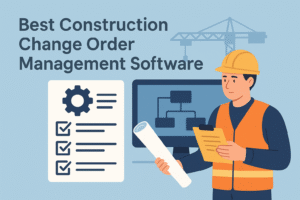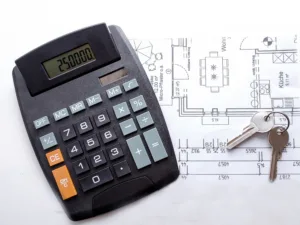Starting a construction company can be a challenging but rewarding experience. With the right preparation, knowledge, and skills, you can start a construction company and establish a successful construction business. This blog post will provide a comprehensive guide on how to start a construction company, including tips on creating a business plan, securing financing, obtaining licenses and permits, building a team, registering your business, and purchasing equipment and material.
Table of Contents
Step 1: Create a Construction Business Plan
The first step in starting your own construction company is to create a construction business plan. A construction business plan is a document that outlines your business goals, strategies, financial projections, and considerations for construction accounting processes. It is essential to have a solid construction business plan as it will serve as a roadmap for your company’s success throughout the startup stage and beyond. Here are the critical elements of a business plan for a construction company:
1. Executive Summary
The executive summary is a brief overview of your business plan. It should include a description of your company, the products or services you offer, your target market, and your competitive advantage.
2. Company Description
In this section, you should provide a detailed description of your construction company. Include information such as the company’s name, location, legal structure, and mission statement. It’s essential to carefully consider the right business entity and business structure for your construction company, as these decisions will significantly impact the legal and organizational setup, influencing everything from liability and taxes to your ability to grow and scale.
3. Products and Services
List the products or services your construction company will provide. Be specific about the types of construction projects you will undertake, such as residential or commercial construction, remodeling, or renovation.
4. Market Analysis
Conduct research on the construction industry in your area. Conducting market research will help you understand your target audience, the services they need, and how you can position your company to stand out from the competition. Researching the market will also help you identify potential areas for growth and help you develop a business plan that will guide your company’s growth. Consulting construction industry publications is essential for up-to-date market research and trends in the construction sector.
5. Marketing and Sales Strategies
Outline your marketing and sales strategies. Explain how you will reach your target market and promote your construction services. Your marketing strategy should be focused on reaching your target audience and highlighting the unique value proposition of your company. It’s crucial to align these marketing efforts with your overall business strategy, ensuring that they not only focus on specific projects to enhance skills and improve reputation but also drive future business success by addressing specific needs within the local community. Consider investing in digital marketing, such as social media advertising and search engine optimization, as well as traditional marketing tactics like print advertising and direct mail campaigns.
6. Management Team and Personnel
Describe the management team and personnel you need to run your construction company. Include their roles and responsibilities, qualifications, and experience.
7. Financial Projections
Provide financial projections for your construction company. This should include a balance sheet, income statement, and cash flow statement. Explain your assumptions and how you arrived at your financial projections.
Step 2: Secure Financing
Most construction companies require significant capital to start, emphasizing the importance of exploring various financing options. Starting a construction company requires a significant amount of capital, and you will need to secure financing to cover the costs of equipment, supplies, insurance, and payroll. Several ways to secure funding for your construction company include loans from banks and other financial institutions, angel investors, venture capital, and crowdfunding. Here are some financing options for your construction company:
1. Self-Financing
If you have savings, you can use them to finance your construction company. This option allows you to avoid debt and control your business altogether.
2. Small Business Loans
You can apply for a small business loan from a bank or other financial institution. The Small Business Administration (SBA) also offers loan programs specifically for small businesses.
3. Investors
You can also seek investors to finance your construction company. This option may require you to give up some control of your business, but it can provide the capital you need to get started.
Step 3: Obtain Licenses and Permits
To operate a construction company, you must obtain the necessary licenses and permits from your state and local government. Registering your business as a limited liability company (LLC) can offer significant legal and financial protection, separating personal assets and debts from the company’s finances. However, it’s important to note that while an LLC can provide individual protection, raising investment capital might be more challenging. The requirements for these licenses and permits vary depending on where you live, so it is important to research what is required in your area. Here are some standard licenses and permits you may need:
1. Contractor’s License
Most states require contractors to have a license to operate. The requirements for a contractor’s license vary by state but typically involve passing an exam and demonstrating experience in the construction industry.
2. Business License
You may also need to obtain a business license to operate your construction company. This license is issued by your local government and is required for all businesses operating in the area.
3. Building Permits
You will need to obtain building permits for each construction project you undertake. Your local government issues these permits and ensures that your construction project meets safety and building codes.
Step 4: Build a Team
A successful construction company relies on a skilled and dedicated team. Depending on the size of your company and the scope of the projects you plan to undertake, you may need to hire architects, engineers, project managers, construction workers, and administrative staff. Building a solid team is essential to your company’s success, so take the time to hire the best people for the job. Here are some tips for building a team for your construction company:
1. Hiring Employees
When hiring employees, look for individuals with experience in the construction industry. You can post job openings on job boards or social media platforms. Conduct interviews and check references before making a hiring decision.
2. Subcontractors
You may need to hire subcontractors for specialized tasks, such as plumbing or electrical work. When hiring subcontractors, make sure they have the necessary licenses and insurance. It’s also essential to have a written contract that outlines the scope of work and payment terms.
3. Vendors
You must work with vendors to purchase equipment, supplies, and materials. Look for vendors who offer competitive pricing and quality products. Build relationships with vendors to ensure reliable and timely deliveries.
Step 5: Establish a Safety Program
Construction work is inherently dangerous, so it’s essential to establish a safety program to protect your employees and customers. Your safety program should include safety policies, procedures, and training. Additionally, securing general liability insurance is crucial for protecting against potential liabilities such as worksite injuries, accidents, and legal issues. Here are some tips for establishing a safety program for your construction company:
1. Safety Policies
Create safety policies that address potential hazards and risks on construction sites. These policies should cover topics such as personal protective equipment, fall protection, and hazard communication.
2. Safety Procedures
Develop safety procedures that detail how to perform construction tasks safely. These procedures should be specific to your construction projects and consider each project’s particular hazards and risks of each project.
3. Training
Provide training to your employees on safety policies and procedures. This ongoing training should cover topics such as hazard recognition, emergency response, and safe work practices.
Step 6: Develop a Quality Control Program
Developing a quality control program is essential to ensure your construction projects meet the highest quality standards. Your quality control program should include procedures for inspecting work and correcting any deficiencies. Here are some tips for developing a quality control program for your construction company:
1. Quality Control Procedures
Create quality control procedures covering each construction stage, from design to completion. These procedures should detail how to inspect work, identify and correct deficiencies.
2. Inspection Checklists
Develop inspection checklists that outline the specific quality standards for each construction project. These checklists should be used to ensure that all work meets these standards.
3. Corrective Action Procedures
Establish procedures for correcting any deficiencies found during inspections. These procedures should detail how to identify the root cause of the deficiency, develop a corrective action plan, and verify that the correction was effective.
Step 7: Register your business
Registering your construction business is an essential step in starting your company. To register, you must choose a business name and check if it is available in your state. Next, you will need to obtain any necessary licenses and permits, which can vary depending on your location and the type of construction work you plan to do. You may also need to register with the IRS and obtain an Employer Identification Number (EIN) for tax purposes. It’s important to ensure that all of your paperwork is complete and up-to-date to avoid legal issues. By taking the time to register your business correctly, you can protect your company and set yourself up for long-term success.
Step 8: Set up your office and warehouse
Setting up an office and warehouse for a construction business requires careful planning and consideration of the company’s needs. The first step is to choose a convenient location for customers and suppliers, offering ample space for the office and warehouse. Once the site has been selected, the office should be designed to promote productivity and efficiency. This includes selecting comfortable and functional furniture, setting up an IT infrastructure that supports the needs of the business, and creating a filing system that keeps important documents organized and easily accessible. The warehouse should be designed to optimize storage and access to tools and equipment, with safety protocols in place to prevent accidents. It’s essential to ensure that the office and warehouse are adequately equipped with the necessary utilities such as electricity, internet, and water. A construction business can increase productivity, safety, and profitability by carefully planning and setting up the office and warehouse.
Step 9: Purchase equipment and materials
When starting a construction company, there are several essential pieces of equipment and materials that you will need to purchase to ensure that your operations run smoothly. Some of the key pieces of equipment that you may need to invest in include heavy machineries such as excavators, bulldozers, and cranes, as well as smaller tools like hammers, drills, and saws. Additionally, you must purchase safety gear for your workers, such as hard hats, safety glasses, and gloves, to ensure they are protected on the job site. Other essential materials include lumber, cement, steel, and insulation. It’s important to carefully consider your specific needs and budget when making purchasing decisions and to invest in high-quality equipment and materials that will last for the long term.
Step 10: Launch your construction business
Finally, it’s time to launch your construction company. This involves executing your business plan, getting your team up and running, and delivering high-quality work to your clients. By developing a solid business plan, registering your business, building a strong team, and networking with potential clients and suppliers, you can establish a strong foundation for your company. It’s essential to stay focused on your goals and adapt to the changing needs of the industry to remain competitive and grow your business. With persistence and a commitment to excellence, you can successfully launch your construction company and build a reputation for delivering high-quality projects that meet your clients’ needs.
Conclusion
Starting a construction company requires careful planning, financing, licensing, team building, and safety and quality control programs. By following these steps, you can establish a successful construction business that meets the needs of your customers and the highest standards of quality and safety. Remember to continuously evaluate and adapt your business plan to stay competitive in the ever-changing construction industry. Starting a construction company may be challenging, but with the proper planning, preparation, and execution, you can build a successful business that allows you to do what you love while making a positive impact in your community. Good luck on your journey to becoming a successful construction business owner!
Related posts
Read our other articles where you can find useful and relevant information about starting a construction company:
- How to Increase Your Construction Company’s Profitability
- How to be a better construction project manager?
- Master the Bid: Proven Strategies on How to Win More Construction Bids
- How to Manage Rising Costs in the Construction Industry?
- Mistakes to Avoid When Starting a Construction Company
About the Author

Mikk Ilumaa
Mikk Ilumaa is the CEO of Bauwise, a leader in construction financial management software with over ten years of experience in the construction software industry. At the helm of Bauwise, Mikk leverages his extensive background in developing construction management solutions to drive innovation and efficiency. His commitment to enhancing the construction process through technology makes him a pivotal figure in the industry, guiding Bauwise toward setting new standards in construction financial management. View profile






